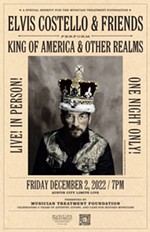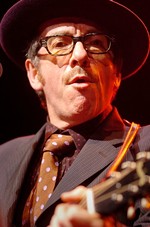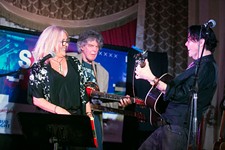15 Minutes with Elvis Costello
A few pages from an almost 700-page book – as told by the author
By Jim Caligiuri, 11:00AM, Thu. Oct. 15, 2015
I love Elvis. Have since the first time I heard “Watching the Detectives” in 1977. Once an angry young man and now a member of the Rock & Roll Hall of Fame, his new memoir Unfaithful Music & Disappearing Ink made me fall in love with him all over again. Here’s an excerpt from a long conversation we had last week. He’s at BookPeople on Tuesday to further discuss.

Austin Chronicle: I want to introduce myself by saying I saw you perform at C.W. Post College on Long Island in 1978. The show was in a lecture hall of some sort, not the ideal setting for the raucous music you were making.
Elvis Costello: I found when I started writing this book saying the same thing in different times about music being made. My grandfather played because he was supposed to, because he was in a uniform and that's what he did on cue. He was in the army.
My dad wanted to play jazz originally. He and my mother had to run their own music nights where they let them put music on. You couldn’t call it a jazz club like in a movie. It would just be some village hall or some back room in a pub where they’d let you charge to get in to cover the costs.
I did the same thing in Liverpool in the early Seventies and even in the late Seventies as a professional musician. We played everywhere; gymnasiums, Jai alai courts, high schools, old vaudeville theatres that had been beaten up and handed over to the rock & roll promoters. It was the smell of sticky carpets and god knows what.
AC: Many years later at the same school, you played a solo show – with Nick Lowe opening. The songs were just as poignant without the electricity. Some artists can’t accomplish that. What’s you secret to making things like that work?
EC: Some of those songs were written in the dead of night, when I was living in a block of flats with a young son. I was singing sort of sotto voce, but in a kind of furious way. I kind of knew the energy of the songs, but I didn’t really know until I recorded it. Some got even more energetic when they were performed in front of an audience. But what I heard in my head was [unintelligible, urgent whisper]. So it’s not that hard to return to something like that.
Or you make a more conscious decision to actually take a song that was very furious, but was a great piece of music, and take a bit more time with it musically when you play it solo to let the words really get heard. Sometimes you discover what they were: “I had no idea they were so emotional.” Or they were about something and I didn’t know. It was just this sound that was happening and I knew it was something I liked. Both things have value.
Jazz musicians make a living out of constantly reinventing their ideas of harmonic possibilities of a song. I’m not someone who can play their instrument and have that kind of creative endeavor. But I can do something with words and music that changes the way the emphasis lies. That’s what stops it from becoming a ritual or a routine over a long time.
AC: One of the things made obvious in the book is your appreciation for a range of American music. Keith Richards said the same thing in his book although he’s a generation older. It’s a weird twist that English musicians turn Americans onto music we may have missed in our own country.
EC: The Beatles and the Stones used rock & roll and rhythm & blues, but I missed that. I was too young. I heard rock & roll as it was interpreted by that generation of musicians. The music in my house growing up was Frank Sinatra, Ella Fitzgerald, and Peggy Lee. I knew the names of more jazz musicians than rock & roll musicians. There wasn’t a lot of rock & roll played on BBC radio.
In my house, it was jazz, be-bop, and post-bop. Dizzy Gillespie and Charlie Parker. Of course I didn’t understand it. It sounds crazy when you’re a kid. But I became curious when I was able to explore it more. My father had to learn to sing the hits of the day, so he’d bring home Four Tops records. It was all the same to us.
AC: You covered “I Can’t Stand Up for Falling Down,” and just the other day I heard the original Sam & Dave version. I was stunned at the slower arrangement. It must have been difficult to get records like that in England in the Sixties.
EC: I knew like four or five Sam & Dave records, but those would be the same ones that everyone would know. When it came time to kind of change our methods, after we’d made three records rather quickly, I remember coming into the studio to record my fourth album – the third with the Attractions. We laid down all the songs that I’d written while we’d been on the road. I didn’t like the way any of them sounded. The way we were recording was starting to become predictable.
At the time, I was listening to a lot of R&B from the late Sixties, and I initially went and bought a stack of Stax records. I went through looking for ideas, clues. I liked “Time Is Tight” and wondered why we couldn’t write something like it with the same spacing. I wondered why it wasn’t going to come out sounding like Al Green.
Guess what? I’m not Al Green.
But if you listen to “Opportunity” from Get Happy, somewhere deep down in that I was trying to play like the Hodges brothers. You can sort of get it, but it’s so far away from the model that it sounds like something original. The most obvious transformation in that stack of singles was a Sam & Dave B-side. It’s a slow, gospel-based ballad. I couldn’t sing like Sam Moore, so I had to speed it up.
Funny enough, I slow it down now when I play solo. I’ve learned how to feel it.
AC: It’s been pointed out to me that you wrote the book on your own. How long did it take to write?
EC: I signed on to write it 10 years ago or more. So I made a number of starts, but I was dissatisfied with them. I took me a while to work out exactly what I wanted to do. I wasn’t sure quite how to approach it, because I knew it wasn’t going to start “I was born” and end some time later. I had to find a way that was more interesting than, “I did this, then I did this, then I did this.” There had to be a reason for why I did that. How I came to be doing something – what I’d seen, what it felt like.
You can read those on the Internet, when I did something. Look at Wikipedia. Those things exist. They’re full of inaccuracies as are all the things with my face on them. Some from people with an axe to grind. So I get emotional. I say I wasn’t feeling that great when I did that or I wasn’t proud of that. I was trying to put it in a book because someday I might not remember things as well as I do now. I have young sons and I’d rather they hear some of the bad things from me.
AC: I was drawn to the portion of the book where you write about what’s probably your signature song, “Alison.” You do a wonderful job of explaining exactly where you were and what you were thinking.
EC: There’s nothing really more to say. Other than if you want to read something about that, then read THAT. I won’t say it better now to you, because it takes a while to write clearly and with balance about things that are funny. Like I’ve been asked to mime on the radio. There are things that you’ve got to look back on and say those are just some idiotic things that happened.
AC: Why did you choose not to have a co-writer?
EC: Because I don’t need a co-writer. Do you want the other 100,000 words I took out? I don’t have a problem with fluency. I could have written the book twice over and have done so in getting the one that I wanted. If it’s too long for some people’s tastes, that's just too bad. This is the length [nearly 700 pages] it wanted to be.
A note to readers: Bold and uncensored, The Austin Chronicle has been Austin’s independent news source for over 40 years, expressing the community’s political and environmental concerns and supporting its active cultural scene. Now more than ever, we need your support to continue supplying Austin with independent, free press. If real news is important to you, please consider making a donation of $5, $10 or whatever you can afford, to help keep our journalism on stands.
Kevin Curtin, Aug. 22, 2022
Jim Caligiuri, Sept. 2, 2009
April 14, 2017
March 18, 2017
Elvis Costello, Elvis Costello & the Attractions, Sam & Dave, Stax, Beatles, Rolling Stones, Keith Richards, Frank Sinatra, Ella Fitzgerald, Peggy Lee, Charlie Parker, Dizzie Gillespie, Al Green, Nick Lowe










